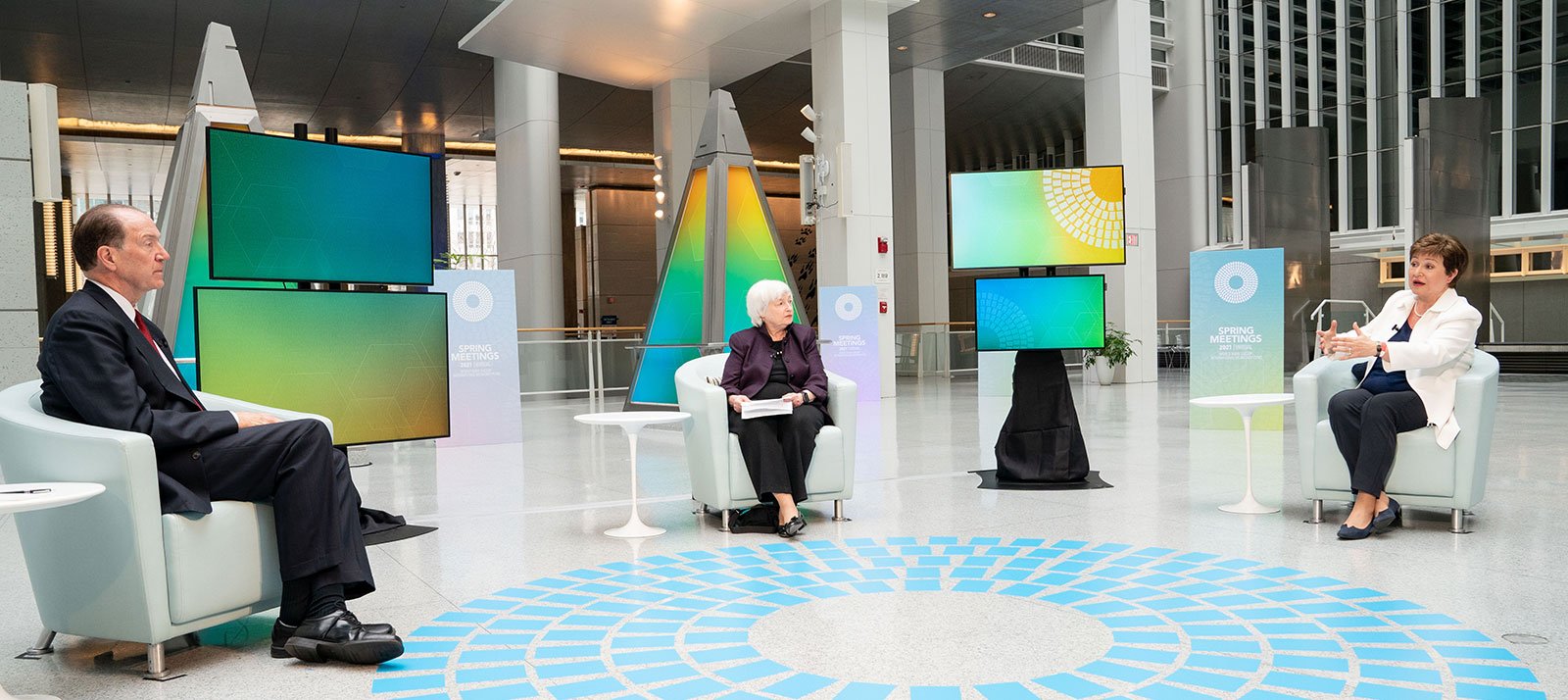Working with its members, the IMF is managing the risks and opportunities of climate change
The IMF took its first major step into the climate change debate in 2008, when a chapter in the World Economic Outlook (WEO) identified climate change as “a potentially catastrophic global externality and one of the world’s greatest collective action problems.”

Policy research and analysis
Analyses cover a broad range of climate- related topics.
The October 2020 WEO showed how green investment, combined with a steadily rising carbon price, could boost global growth in the next 15 years of the recovery by about 0.7 percent of global GDP on average, and create millions of new jobs.
More recently, the first IMF Staff Climate Note highlighted the need for faster and more coordinated action on carbon pricing. Such measures are gaining the spotlight in discussions with IMF members.
Country economic surveillance
Every year or two, IMF staff meet with each of our 190 members to discuss economic developments and ensure that their policies support inclusive growth and development, an activity known as Article IV surveillance.
Since 2015, the IMF’s coverage of climate change during surveillance has steadily increased. Country authorities facing climate-related transitions and resilience challenges are eager for policy advice. In the past year, for example, climate issues featured in about 30 of our country assessments, including for Canada, Germany, Korea, the United Kingdom, and the United States.
Loading component...
The IMF will cover mitigation policies in the 20 largest greenhouse gas emitters—that together account for more than 80 percent of all such emissions. In countries especially vulnerable to climate change, our assessments will focus on adaptation policies to build resilience to climate-related disasters.
Financial sector analysis
In 2021, the IMF Executive Board approved proposals for more in-depth climate-related risk assessment and expanded mandatory surveillance from 29 countries to 47. The IMF’s Financial Sector Assessment Program (FSAP) will now cover physical climate change risks and potential transition risks as the world moves to a low-carbon economy and the value of high-carbon assets declines.
Previous insurance stress testing assessments focused on risk factors such as droughts, floods, and storms for small island countries, such as Jamaica. For advanced economies, such as Belgium, FSAPs covered natural catastrophe risks through insurance stress testing. Climate risk stress testing in FSAPs can identify financial system pressure points from physical climate shocks and the transition to a low-carbon economy. Recent FSAPs in Norway and the Philippines included climate risk stress testing. Assessments of regulatory and supervisory frameworks can ensure appropriate prudential supervision of all climate risks across a country’s entire financial system.
Better data, better decisions
Three building blocks will strengthen the climate information architecture: (1) high-quality, reliable, and comparable data; (2) a harmonized and consistent set of climate disclosure standards; and (3) a broadly approved global taxonomy. Together, these can unlock trillions of dollars in green finance and help turn the tables on global warming—so the IMF also supports efforts to improve data, disclosure, and taxonomies so that investors can make informed decisions to effectively price and manage climate risks.
Better data can improve policies and decision- making by country authorities. Recognizing the need for sound climate data, in 2021 the IMF launched an experimental climate data dashboard. The dashboard aims to contribute to statistical cooperation on climate-change-related data and overcome challenges to integrating climate change into the macroeconomic statistics framework.
Capacity development
The IMF’s capacity development activities —which give members the tools and expertise for effective fiscal planning and monetary frameworks— increasingly cover climate-related topics.
On fiscal issues, member support includes mitigation and adaptation policies and measures to build resilience. Technical assistance missions have helped develop carbon pricing programs and related tax policies. And small island states have received help with post-hurricane public financial management reviews and fiscal risk management for natural disasters.
The IMF will likely scale up all aspects of climate-related capacity development. For example, a new diagnostic tool, the Climate Macroeconomic Assessment Program, built in conjunction with the World Bank, will assess the macro-fiscal risks of climate shocks and stresses, the preparedness of climate vulnerable countries, and the implications of climate mitigation policies, such as carbon pricing.
Capacity development is often delivered in collaboration with institutions such as the World Bank, the International Energy Agency, and the Organisation for Economic Co-operation and Development and through organizations such as the Group of Seven and Group of Twenty.
Opinions expressed in articles and other materials are those of the authors; they do not necessarily reflect IMF policy.






